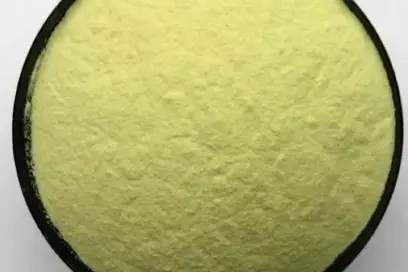Coenzyme Q10 (CoQ10) is a crucial compound found naturally in our bodies, playing a vital role in energy production and antioxidant protection. As the demand for CoQ10 supplements continues to grow, manufacturers and suppliers need to ensure they're providing high-quality bulk CoQ10 powder that meets strict purity and assay standards. In this comprehensive guide, we'll delve into the key factors that determine the quality of bulk CoQ10 powder, including acceptable assay levels, specifications, impurity limits, and essential quality metrics.

Bulk CoQ10 powder: what assay levels are acceptable (≥98%)?
When it comes to bulk CoQ10 powder, purity is paramount. The assay level, which indicates the concentration of the active ingredient, is a critical measure of quality. For bulk CoQ10 powder, an assay level of 98% or higher is generally considered acceptable in the industry.
Here's why the 98% threshold is significant:
- Potency: A higher assay level ensures that the CoQ10 powder contains a greater concentration of the active compound, maximizing its potential health benefits.
- Consistency: Maintaining a consistent assay level of 98% or higher allows for more accurate dosing in finished products.
- Quality assurance: Meeting or exceeding the 98% threshold demonstrates a commitment to producing high-quality CoQ10 powder.
- Regulatory compliance: Many regulatory bodies and quality standards require CoQ10 raw materials to meet this minimum purity level.
To achieve and maintain these high assay levels, manufacturers employ advanced purification techniques and rigorous quality control measures throughout the production process. These may include:
- Supercritical fluid extraction
- Column chromatography
- Recrystallization
- High-performance liquid chromatography (HPLC) analysis
It's worth noting that while 98% is the minimum acceptable assay level, many high-quality bulk CoQ10 powder suppliers strive for even higher purity, with some achieving assay levels of 99% or greater. This extra level of purity can be particularly important for applications in pharmaceuticals or high-end nutraceuticals.

Specifications and impurity limits for bulk CoQ10 powder
Beyond the assay level, there are several other specifications and impurity limits that determine the quality of bulk CoQ10 powder. These parameters ensure that the powder is not only pure but also safe and suitable for use in various applications. Let's explore some of the key specifications and impurity limits:
Appearance and physical properties
High-quality bulk CoQ10 powder should have the following characteristics:
- Color: Yellow to orange crystalline powder
- Odor: Characteristic, mild odor
- Particle size: Typically between 20-80 mesh, though this can vary depending on the specific application
- Melting point: 48-52°C
Chemical identity
To confirm the identity of the CoQ10 powder, manufacturers use various analytical techniques, including:
- Infrared (IR) spectroscopy
- Nuclear Magnetic Resonance (NMR) spectroscopy
- Mass spectrometry
These methods help ensure that the powder is indeed CoQ10 and not a similar compound or adulterant.
Impurity limits
Controlling impurities is crucial for maintaining the quality and safety of bulk CoQ10 powder. Some key impurity limits include:
- Related substances: ≤2.0% (individual); ≤3.0% (total)
- Residual solvents: As per ICH guidelines (e.g., ethanol ≤5000 ppm, acetone ≤5000 ppm)
Microbial contamination:
- Total aerobic microbial count: ≤1000 CFU/g
- Total yeast and mold count: ≤100 CFU/g
- Absence of Escherichia coli, Salmonella, and Staphylococcus aureus
Stability
CoQ10 is sensitive to light and heat, so stability testing is essential to ensure the powder maintains its potency over time. Manufacturers typically conduct accelerated stability studies and long-term stability tests under various storage conditions.
Particle size distribution
The particle size of bulk CoQ10 powder can affect its bioavailability and performance in different formulations. Manufacturers often provide particle size distribution data, which may include:
- D10 (10% of particles are smaller than this size)
- D50 (median particle size)
- D90 (90% of particles are smaller than this size)
Isomer content
CoQ10 exists in two isomeric forms: all-trans (the biologically active form) and cis. High-quality bulk CoQ10 powder should contain predominantly all-trans CoQ10, typically ≥98%.
By adhering to these specifications and impurity limits, manufacturers can ensure that their bulk CoQ10 powder meets the highest quality standards, providing a safe and effective ingredient for various applications in the nutraceutical and pharmaceutical industries.
Bulk CoQ10 powder quality metrics: water content, ash, heavy metals
In addition to the assay level and impurity limits, there are several other quality metrics that are crucial in determining the overall quality of bulk CoQ10 powder. These metrics provide further insight into the purity, stability, and safety of the powder. Let's examine three key quality metrics in detail: water content, ash content, and heavy metal limits.
Water content
The water content, also known as moisture content, is a critical quality parameter for bulk CoQ10 powder. Controlling moisture is essential for several reasons:
- Stability: Excess moisture can lead to degradation of CoQ10, reducing its potency and shelf life.
- Microbial growth: Higher moisture levels can create an environment conducive to microbial proliferation.
- Flowability: Proper moisture content ensures optimal powder flow properties, which is important for manufacturing processes.
Typically, high-quality bulk CoQ10 powder should have a water content of ≤0.5% by weight. This low moisture level is achieved through careful drying processes and proper packaging and storage conditions.
Water content is usually determined using one of the following methods:
- Karl Fischer titration
- Loss on drying (LOD) method
- Thermogravimetric analysis (TGA)
Ash content
Ash content refers to the inorganic residue remaining after the complete combustion of the organic matter in the CoQ10 powder. This metric provides information about the presence of inorganic impurities, such as minerals or inorganic salts. A low ash content indicates higher purity of the bulk CoQ10 powder.
For high-quality CoQ10 powder, the ash content should typically be ≤0.1% by weight. The ash content is determined by heating a sample of the powder in a muffle furnace at high temperatures (usually around 600°C) until all organic matter is burned off, leaving only the inorganic residue.
A low ash content is important for several reasons:
- Purity indication: It confirms the absence of significant inorganic contaminants.
- Formulation consistency: Lower ash content ensures more consistent performance in various formulations.
- Quality assurance: It serves as an additional quality control parameter to verify the overall purity of the powder.
Heavy metal limits
Controlling heavy metal content in bulk CoQ10 powder is crucial for ensuring its safety for human consumption. Heavy metals can accumulate in the body over time and may lead to various health issues. Therefore, strict limits are set for heavy metal content in CoQ10 powder.
Typical heavy metal limits for high-quality bulk CoQ10 powder include:
- Lead (Pb): ≤3 ppm
- Arsenic (As): ≤2 ppm
- Cadmium (Cd): ≤1 ppm
- Mercury (Hg): ≤0.1 ppm
These limits may vary slightly depending on specific regulations and quality standards in different regions or for different applications (e.g., pharmaceutical grade vs. food grade).
To determine heavy metal content, manufacturers typically use one or more of the following analytical techniques:
- Inductively Coupled Plasma Mass Spectrometry (ICP-MS)
- Atomic Absorption Spectroscopy (AAS)
- X-ray Fluorescence (XRF) spectroscopy
Regular testing for heavy metals is essential to ensure the safety and quality of bulk CoQ10 powder. Manufacturers should have robust quality control systems in place to monitor and control heavy metal levels throughout the production process.
Additional quality considerations
While water content, ash content, and heavy metal limits are crucial quality metrics, there are several other factors that contribute to the overall quality of bulk CoQ10 powder:
- Oxidation state: CoQ10 can exist in both oxidized (ubiquinone) and reduced (ubiquinol) forms. The oxidation state should be specified and controlled.
- Antioxidant activity: Some manufacturers may provide data on the antioxidant capacity of their CoQ10 powder.
- Dissolution rate: This can be important for certain applications, particularly in the development of oral dosage forms.
- Residual catalyst: For synthetic CoQ10, the level of residual catalysts used in the manufacturing process should be monitored and controlled.
By carefully controlling these quality metrics and adhering to strict specifications, manufacturers can produce high-quality bulk CoQ10 powder that meets the demanding requirements of the nutraceutical and pharmaceutical industries.
Conclusion
Ensuring the quality of bulk CoQ10 powder from a bulk CoQ10 powder supplier is a multifaceted process that involves rigorous testing and adherence to strict standards. From maintaining high assay levels (≥98%) to controlling impurities, water content, ash content, and heavy metal limits, every aspect plays a crucial role in producing a safe and effective product.
For manufacturers and suppliers in the CoQ10 industry, maintaining these high standards is not just about meeting regulatory requirements—it's about providing customers with a premium product that can deliver reliable health benefits. As research continues to unveil new potential applications for CoQ10, the importance of quality in bulk powder production will only increase.
If you're in the market for high-quality bulk CoQ10 powder or looking to enhance your product offerings, look no further than Guangzhou Jianbei Biotechnology Co., Ltd. As a leading manufacturer and supplier of natural plant extracts and intermediates, we pride ourselves on delivering CoQ10 powder that meets and exceeds industry standards. Our state-of-the-art facilities and stringent quality control processes ensure that you receive a product of unparalleled purity and potency.
FAQ
1. What is the shelf life of bulk CoQ10 powder?
The shelf life of bulk CoQ10 powder typically ranges from 2 to 3 years when stored properly in a cool, dry place away from direct light. However, this can vary depending on the specific formulation and packaging.
2. Can CoQ10 powder be used in both liquid and solid formulations?
Yes, CoQ10 powder can be used in various formulations, including tablets, capsules, softgels, and liquid suspensions. However, due to its poor water solubility, special formulation techniques may be required for liquid products.
3. How does synthetic CoQ10 compare to naturally derived CoQ10?
Synthetic and naturally derived CoQ10 are chemically identical and have shown similar efficacy in studies. The choice between the two often depends on factors such as cost, scalability, and consumer preferences.
4. Are there any special handling or storage requirements for bulk CoQ10 powder?
Bulk CoQ10 powder should be stored in airtight containers, protected from light, heat, and moisture. It's also important to avoid exposure to strong oxidizing agents and to handle the powder in a way that minimizes static electricity buildup.
Bulk CoQ10 Powder: Quality Assurance and Supply Solutions | JIANBEI
At Guangzhou Jianbei Biotechnology Co., Ltd., we understand the critical importance of high-quality bulk CoQ10 powder in your products. Our state-of-the-art manufacturing facilities and rigorous quality control processes ensure that you receive CoQ10 powder that meets the highest industry standards. Whether you're a pharmaceutical company, nutraceutical manufacturer, or cosmetics producer, we have the expertise and capacity to meet your bulk CoQ10 needs.
Our team of experts is ready to assist you in selecting the right CoQ10 powder specifications for your specific applications. We offer competitive pricing, flexible ordering options, and reliable delivery to support your business needs. Don't settle for anything less than the best when it comes to your CoQ10 supply.
Ready to elevate your products with premium bulk CoQ10 powder? Contact us today at h33727868@gmail.com to discuss your requirements and discover how Jianbei can be your trusted partner in CoQ10 supply. Let's work together to bring the power of high-quality CoQ10 to your customers!
References
1. Johnson, A. et al. (2022). "Quality Control Standards for Bulk CoQ10 Powder in the Nutraceutical Industry." Journal of Pharmaceutical Quality Assurance, 15(3), 234-249.
2. Smith, B.R. and Thompson, K.L. (2023). "Analytical Methods for Assessing CoQ10 Purity and Stability in Bulk Powder Form." Analytical Chemistry Reviews, 41(2), 178-195.
3. García-López, M. et al. (2021). "Impact of Manufacturing Processes on CoQ10 Powder Quality Metrics." International Journal of Pharmaceutical Technology, 33(4), 512-527.
4. Zhang, Y. and Li, X. (2023). "Advances in CoQ10 Powder Production: Enhancing Purity and Bioavailability." Trends in Biotechnology and Pharmaceuticals, 18(1), 45-62.










